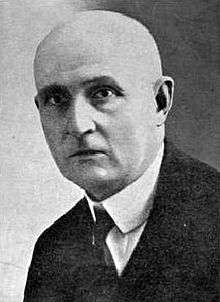Enrico Corradini
| Enrico Corradini | |
|---|---|
 | |
| Personal details | |
| Born |
July 20, 1865 near Montelupo Fiorentino |
| Died |
December 10, 1931 (aged 66) Rome |
| Political party |
Italian Nationalist Association (1910–1923) National Fascist Party (1923–1931) |
| Occupation | novelist, essayist, journalist, and nationalist political figure |
| Religion | Roman Catholic |
Enrico Corradini (July 20, 1865 – December 10, 1931) was an Italian novelist, essayist, journalist and nationalist political figure.
Biography
Corradini was born near Montelupo Fiorentino, Tuscany.
A follower of Gabriele D'Annunzio, he founded the right-wing newspaper Il Regno (1903-1905), together with intellectuals Giovanni Papini, Vilfredo Pareto, and Giuseppe Prezzolini. It quickly became a staple for irredentist and radical thought that was to blend into Fascism. In 1910, the Italian Nationalist Association (Associazione Nazionalista Italiana, ANI) was founded with the participation of Corradini, who was among the leaders. It made a name for itself after giving full support to Italian imperialism and the Italo-Turkish War of 1911 - Corradini wrote two political essays on the matter (Il volere d'Italia - "Italy's Desire", and L'ora di Tripoli - "Tripoli's Moment"). He expanded such bellicose theories in the weekly L'Idea Nazionale, founded by him together with Alfredo Rocco and Luigi Federzoni.
L'Idea Nazionale was turned into a daily with financing from natural advocates of militarism - military men and weapon manufacturers. Corradini and his paper created a generic nationalist theory after adopting Populism and Corporatism, while advocating Italy's entry into World War I - initially on the side of the Triple Alliance (the Central Powers, to which Italy had committed itself), then on that of the Triple Entente (the Allies - which promised to grant Italy all its territorial demands). The group also focused on a violent press campaign against Prime Minister Giovanni Giolitti and other supporters of neutrality.
Corradini developed the concept of Proletarian Nationalism in 1919:
| “ | We must start by recognizing the fact that there are proletarian nations as well as proletarian classes; that is to say, there are nations whose living conditions are subject...to the way of life of other nations, just as classes are. Once this is realized, nationalism must insist firmly on this truth: Italy is, materially and morally, a proletarian nation." (Report to the First Nationalist Congress, Florence, December 3, 1919) | ” |
After the war, ANI was led by Corradini into a merger with the Partito Nazionale Fascista (PNF). Nonetheless, Corradini made sure to detach himself from the more controversial actions of the Blackshirts, while being nominated by Benito Mussolini to the Italian Senate, and joining his government in 1928.
As a novelist, Corradini enjoyed success with his La patria lontana ("The Distant Fatherland"; 1910) and La guerra lontana ("The Distant War"; 1911).
He died in Rome.
Works
- Julius Caesar: A Play in Five Acts (1929)
References
- A. James Gregor, Phoenix: Fascism in Our Time (New Brunswick, N.J. : Transaction Publishers, 1999, ISBN 1-56000-422-3), pp. 30–33
External links
- Enrico Corradini's Italian Nationalism: The 'Right Wing' of the Fascist Synthesis by M. Marsella in the Journal of Political Ideologies, Volume 9, Number 2, June 2004, pp. 203–224 (22)
- From Diaspora to Empire: Enrico Corradini's Nationalist Novels by Tullio Pagano in MLN, Volume 119, Number 1, January 2004 (Italian Issue), pp. 67–83